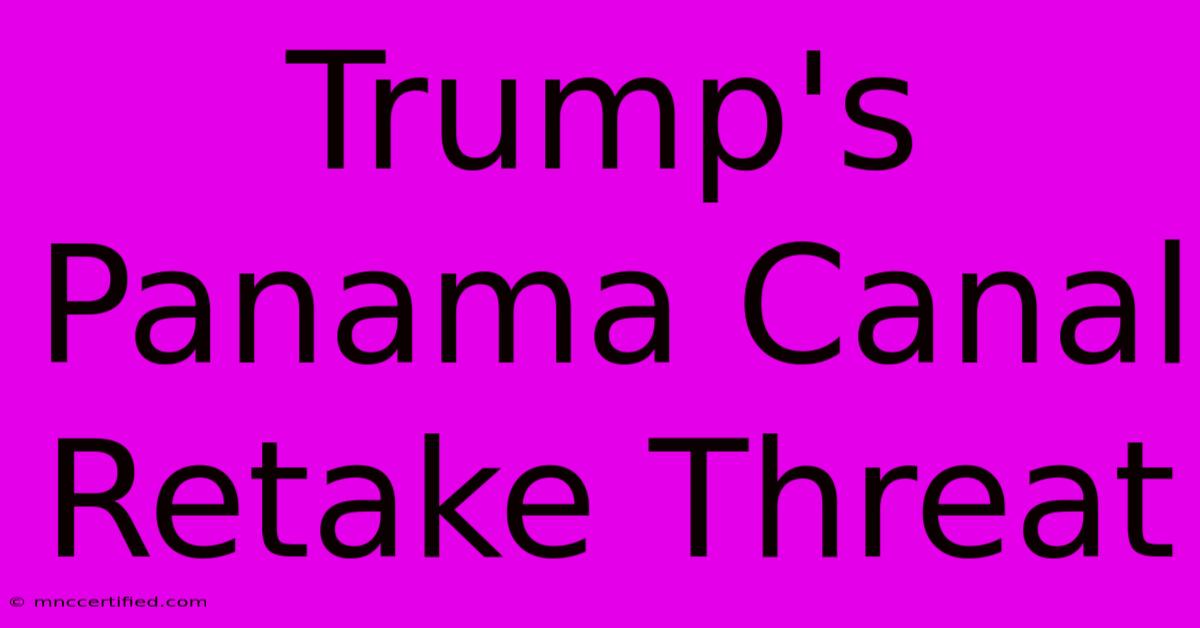Trump's Panama Canal Retake Threat

Table of Contents
Trump's Panama Canal Retake Threat: A Deep Dive into the Rhetoric and Reality
Donald Trump's presidency was punctuated by numerous controversial statements and policy proposals. Among these, his pronouncements regarding the Panama Canal often sparked debate and international concern. While he never explicitly threatened a military takeover, his rhetoric implied a willingness to consider forceful intervention, raising crucial questions about U.S. foreign policy and the future of the canal. This article delves into the context, implications, and ultimate meaning of Trump's statements regarding the Panama Canal.
The Context: Sovereignty and Strategic Interests
Understanding Trump's statements requires examining the historical relationship between the United States and the Panama Canal. The U.S. oversaw the construction and operation of the canal for decades, a legacy that continues to shape the geopolitical landscape. The transfer of control to Panama in 1999 was a landmark event, but the canal remains a critical strategic asset for global trade and U.S. national security.
Trump's rhetoric often centered on American sovereignty and economic interests. His administration frequently voiced concerns about the canal's security and operation, framing them as essential to the economic well-being of the United States. This narrative resonated with his base, who often shared a perception of declining American influence on the world stage.
Specific Instances of Trump's Statements
While there wasn't a single, definitive "retake" threat, several instances revealed a concerning pattern of aggressive rhetoric:
- Informal Comments: Numerous reports surfaced of Trump expressing dissatisfaction with the canal's management in private conversations. These comments, while not publicly released statements, hinted at a potential willingness to reconsider U.S. policy.
- Emphasis on National Security: Public statements from Trump and his administration highlighted the strategic importance of the canal, implicitly suggesting that the U.S. would act to safeguard its interests, even if that implied intervention.
- Economic Concerns: The Trump administration frequently cited concerns about unfair trade practices and potential disruptions to the flow of goods through the canal. These economic anxieties were often presented as justification for a more assertive U.S. role.
Analyzing the Implications: International Relations and Geopolitics
Trump's rhetoric, even without a direct threat of military action, had significant implications for U.S. relations with Panama and other nations. A perceived threat of intervention, regardless of its likelihood, could:
- Damage U.S.-Panama relations: A forceful approach would undoubtedly strain the already complex relationship between the two countries. This could harm diplomatic efforts and hinder future cooperation on various issues.
- Undermine international law: Any unilateral action by the U.S. to seize control of the canal would violate international norms and treaties, potentially leading to widespread condemnation and isolation.
- Escalate regional tensions: Intervention would likely be met with strong opposition from regional actors, potentially leading to a broader conflict.
The Reality: A Low Probability, High-Risk Scenario
While Trump's rhetoric created considerable anxiety, the probability of a U.S. military takeover of the Panama Canal was always low. The political, economic, and logistical challenges would have been immense. Furthermore, such an action would likely have faced significant opposition from both the international community and within the U.S. itself.
Conclusion: The Lasting Impact of Trump's Rhetoric
Although a direct military seizure never materialized, Trump's statements regarding the Panama Canal left a lasting mark. His rhetoric served as a stark reminder of the complexities inherent in managing the legacy of U.S. influence in the region. The episode highlighted the need for careful diplomacy and respect for international norms in addressing strategic interests, particularly those concerning sovereign nations. It also underscored the dangers of inflammatory language in international relations, even when not explicitly calling for action. The incident continues to serve as a case study in the impact of presidential rhetoric on foreign policy and international perceptions.

Thank you for visiting our website wich cover about Trump's Panama Canal Retake Threat. We hope the information provided has been useful to you. Feel free to contact us if you have any questions or need further assistance. See you next time and dont miss to bookmark.
Featured Posts
-
What Is Festivus The Seinfeld Holiday Explained
Dec 24, 2024
-
Celtics Drop Game In Orlando Tatum Sidelined
Dec 24, 2024
-
Matt Gaetz Five Findings From House Report
Dec 24, 2024
-
Fever Sends Bill Clinton To Hospital
Dec 24, 2024
-
Burts Death Crocodile Dundee Croc Dies
Dec 24, 2024